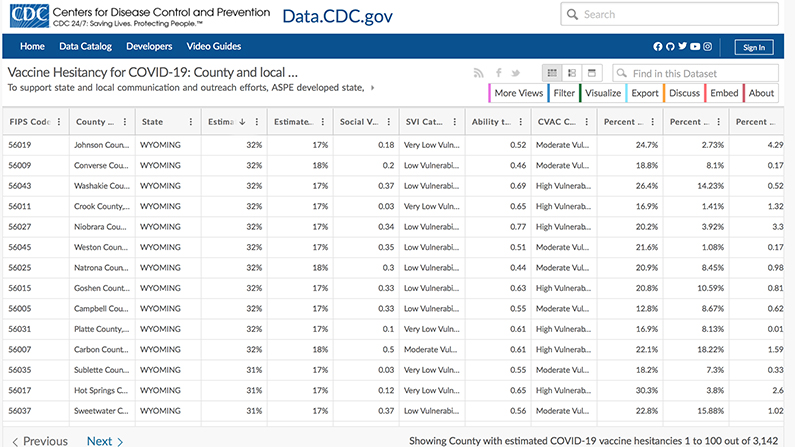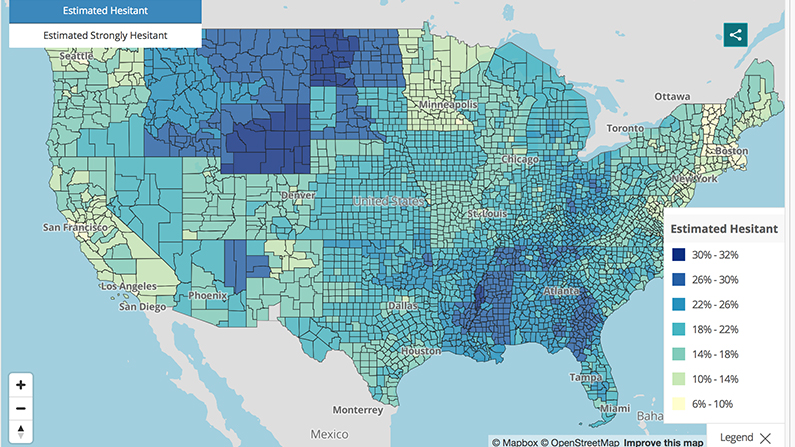The moment that many Americans have waited for for more than a year is finally here: COVID-19 vaccines are now available to everyone aged 16 and older in all 50 states. But some states have populations that are more hesitant than others to take the vaccine, and Wyoming tops the list.
In Teton County, the early demand for COVID-19 vaccines was higher than the number of shots available. Somewhere along the way, though, the county started struggling to administer all of the doses it has in stock.
“This is it, we’re at a tipping point,” said Jodie Pond, director of the Teton County Department of Health at the last COVID-19 Community Update on April 16. “I’ve said this all week: We can go in one direction or another.”
During her remarks, Pond explained that there was a significant slowdown in vaccine bookings over spring break and that the department even canceled one day of shots in early April because demand was so low. She also said the county is experiencing a lot of same-day cancellations, which risks spoiling perishable doses of the valuable vaccines.
“It’s hard because we pull vaccine out of the freezer in the morning and so we scramble in the afternoon to make sure that that vaccine gets used,” she said.
While it’s too early to tell if the local downtick in vaccine demand might be attributable to spring break, Teton County has still vaccinated a larger percentage of its residents than any other county in Wyoming—about 40 percent as of April 19, compared to the second-highest rate of 27 percent in Hot Springs County, according to the Wyoming Department of Health. However, new statistical modeling from the U.S. Department of Health and Human Services and the Centers for Disease Control and Prevention shows that all Wyoming counties fall within the top 1 percent of vaccine hesitancy in the country.

A new statistical modeling shows that 11 Wyoming counties appear to be the most skeptical of getting COVID-19 vaccines in the U.S. (Screenshot of Centers for Disease Control and Prevention data)
Morgan Hughes is a health and education reporter who has been covering statewide vaccine hesitancy for the Casper Star-Tribune.
“Eleven counties in Wyoming are estimated to be more hesitant than any other place in the nation, with 32 percent of residents in those counties estimated to be hesitant to take the vaccine,” Hughes said.
Those very hesitant counties are mostly located across central and eastern Wyoming, but they include some of the state’s largest population centers, like Casper and Gillette. Teton County also isn’t too far behind, with 29 percent of residents estimated to be hesitant. The Wyoming figures track with growing evidence that states with a larger share of Trump voters are more likely to have greater vaccine hesitancy, but Hughes has also been looking deeper into federal and state surveys to find out what’s behind the Cowboy State’s skepticism.
“The top reasons people gave for being hesitant toward the vaccine in Wyoming really dealt with concerns over side effects and concerns about safety,” Hughes said, adding that it’s not necessarily the case that “there’s this big proportion of people in Wyoming who are just really adamantly resistant toward the vaccine. It’s just people have a lot of questions.”
One way Teton County is trying to answer those questions is through a COVID-19 vaccine hotline at 307-732-8628, which Pond promoted during last week’s COVID-19 update.
“If you have questions and you aren’t quite sure you want to get vaccinated, we have our COVID vaccine line where you can talk to a nurse,” she said. “A nurse will call you back and you can ask any questions you like.”
At the same time, other local health leaders, like the former CEO of St. John’s Health, Dr. Paul Beaupre, are trying more direct methods to persuade the vaccine-hesitant.
“I can tell you I’m going department by department in the hospital and encouraging those people that have had some hesitancy about this to reconsider and get vaccinated,” Beaupre said Friday. “And it is our plan at St. John’s as soon as this [vaccine] comes off of [the Food and Drug Administration’s] experimental use [authorization], which I think will happen in the next couple of months—we will mandate vaccination at St. John’s.”
Beaupre said there’s case law that supports employers who want to require workers to get the vaccine, but the hospital’s Board of Trustees also recently approved an incentive of offering $600 bonuses to all full-time employees who have already been vaccinated or who get the inoculation before May 31. The former CEO is also encouraging county residents to persuade folks in their networks the old-fashioned way.
“Please, please, please: Speak to your neighbors, speak to your friends,” Beaupre said. “Have conversations around the table now about the need for all of us to get vaccinated.”
Medical and infectious disease experts across the U.S. are urging American adults to get vaccinated in order to help the country win the race against several more contagious and sometimes more deadly variants of the novel coronavirus, some of which may be less treatable with existing COVID-19 therapies. Hughes, of the Casper Star-Tribune, also said many Wyoming physicians and county health officials are making the case that achieving herd immunity through mass vaccination will pave the way for full economic reopening.
“If residents maybe aren’t quite as concerned about the health impact that contracting COVID would have on them or their family, you know, getting back to a more typical economy, being able to do away with masks… kind of trying to appeal to that kind of sense, I think, is something local officials have been doing a lot,” Hughes said.
Of course, with the use of the one-shot Johnson & Johnson vaccine on pause due to a rare but serious blood clot disorder that developed in six American women, there are concerns that the review will only magnify existing doubts. But local officials, including Teton County Health Officer Dr. Travis Riddell, have maintained that this is exactly how the process is supposed to work.
“I think we’re doing the right thing by pausing use of the vaccine as this situation is fully investigated,” Riddell said at Friday’s briefing. “However, if what we know today is truly the whole story about this vaccine, this is an extremely rare side effect on the order of less than one in a million.”
At that rate, Riddell said Teton County would have to vaccinate its entire population 49 times in order to expect to see one case of the rare complication. European Union regulators also agreed with Riddell earlier this week when they concluded that the benefits of the J&J vaccine outweigh any potential risks.
A decision on the future of the paused vaccine in the U.S. is expected on Friday, April 23, following a meeting of the CDC’s Advisory Committee on Immunization Practices.






